- Home
- Kathryn Lasky
Mary Queen of Scots Page 7
Mary Queen of Scots Read online
Page 7
We do have this time some serious business at Meudon. Now I must finally sign the papers for my mother to become Queen Regent. There is also some unpleasant business to attend to concerning Lord Arran, the Duke of Châtelherault. But first Grandmama wants to show me the improvements made to Meudon.
March 9, 1554
I am very tired. This was not an easy day. I, of course, had to sign the papers that make my mother Queen Regent, but there was the unpleasantness with Lord Arran. It has been discovered that Lord Arran, who was in charge of the treasury, the jewels, and the plate of the estates of Scotland, had been guilty of “defalcations”, which means stealing from the treasury when one is a guardian of that treasury. So first I signed the papers, and then Lord Arran was called in to the grand gallery. I sat in a special chair, the Chair of Estate with the emblems of both my father’s family, the Royal House of Stuart, and my mother’s, the de Guise family, the House of Lorraine. Over the Chair of Estate is the royal canopy. I had rehearsed with my uncles and my grandmama what I was to say. (And to think I had once worried about signing my name and dribbling ink! This was much harder.) But I spoke it well and in a strong voice. “Lord Arran, Duke of Châtelherault, as Queen of the Scots and instrument of the Queen Regent, my mother, I inform you that you are as of this day, this hour, and this minute discharged of your official duties as Lord Governor of the Estates of Scotland and ordered to make restitution to the estates, treasury of the jewels, and plate that you have taken without authority or permission. You are found by the Crown liable and responsible. The Queen Regent in her infinite mercy and the King of France, my own representative in this country, allow that you may keep your titles, but repayment with interest is demanded. Do you accept these requirements?”
“I do, Your Majesty.”
“Go thee to thy confessor and make your peace with our Lord Jesus Christ, our Savior, now that you have made peace with your Queen.”
This was my first royal act. I wish it had not been a “scolding”. I would have liked to have done something grand and wonderful, something that would improve the lot of a nation and not merely reprimand one greedy soul.
I had received from my dear mother a letter counselling me on Lord Arran. This was one that I was not supposed to show to my uncle. So she provided another to show him. It seems my mother feels that there are some treacherous people in the court who might try to intervene and plot on the Lord’s behalf. She cautions me to be aware. As she always does in her letters, she concludes with the words concerning how a sovereign must always proceed with caution and circumspection, and never on sheer impulse.
March 10, 1554
I have written a letter to Mother about the signing of the papers making her the Queen Regent. I sent her my best tidings and told her of my meeting with Lord Arran. I did not want to boast, so I said only that I spoke in a strong, unwavering voice and that Lord Arran accepted our charges with grace and that I then commended him to seek his Father Confessor. I am sure that will please Mother. I told her that we are expecting the birth of a new little cousin any moment and that King Henry and Queen Catherine are intending to come for the christening.
Later
Aunt Anne has begun her lying in. Grandmama therefore cannot go to the grotto with me, as she must attend the birth. I am not allowed. This is most boring for me. I spend my time trying to teach Thimble a trick – jumping through a hoop. He learns it too quickly. What should I teach him next? A Greek poem?
March 11, 1554
Aunt Anne still labours!
Later
Still no baby.
Midnight
A baby boy! He is most adorable. Grandmama came to fetch me. He is plump with cheeks like the rosiest Normandy apples, and he has lots of black hair that sticks straight out from his head. The christening will be in a few days. I hope Francis comes. It seems like forever since I last saw him, and I do miss my Marys but I know they will not be coming.
March 16, 1554
The baby was christened this morning. His name is Charles, and he shall be given the title the Duke of Mayenne. I was permitted a place of honour in the chapel and stood next to my uncle the Cardinal to hold the babe’s cap when it was removed for the Cardinal to sprinkle on the holy water.
I am feeling a bit poorly now, as I think I ate too much at the luncheon. My grandmama’s table is renowned. At least four kinds of birds were served – swan, peacock, capons, and my favourite, heron. There were artichokes and chestnuts cooked with white asparagus. And so many different tarts – plum, apple, custard.
I am trying to improve my manner with the Queen. Would you believe that I even inquired about our ballet master Balthazar? Would one ever imagine that I would dare bring up the subject of ballet? I think even Queen Catherine was surprised. I inquired not only about the ballet master but also Madame de Parois. I am trying. It seems to me that there should be something the opposite of confession. One should be able to go and tell of one’s small moral triumphs. But I suppose that would make one guilty of pride – yet another sin to confess. A vicious circle, I suppose.
March 17, 1554
I am so furious with Queen Catherine. I cannot believe what that horrible, insensitive woman did at the banquet table this evening. She sent her valet de chambre over to tell Francis to blow his nose more often, “for the good of his health”. Well, it is not for the good of his health to be so corrected in public. That woman has the sensitivity of a wild boar. And she looks like one, too. Poor Francis was mortified. I wished so hard in that instant that my nose would start to run. I would never have wiped it. I would have let it just dribble onto the roasted duck, right over the asparagus, maybe onto the little potatoes, and then I would like to be seized by a huge sneeze and spray all over that Italian merchant’s daughter and blow her right back to Italy. I don’t care if she was orphaned when she was two weeks old. She spent much time with the nuns in a convent. She should have learned some tenderness.
PS I must say that writing something as I just did really makes me feel ever so much better than confession would. I suppose, however, that I shall have to seek out Father Confessor Mamerot when I return with the royal family to Paris and the Louvre Palace tomorrow. It is the beginning of Holy Week. We are always in Paris to celebrate Easter.
March 18, 1554
Le Louvre Palace, Paris
It is so hard to be in Paris as spring begins. It is really not the place to be. Thank heaven the four Marys are here. We may all complain together. Spring in the French countryside is magical. We should be at Chambord, or Chenonceau, or Anet, or Fontainebleau, but not here in this smelly old city. The palace is near the marketplace, and we smell all the awful smells – blood from the meat market and the old rotten vegetables that they keep too long, then throw into garbage heaps in the farmers’ market. And then the street gutters swirl with swill – swill I will not describe, for it would be most indelicate. But you might imagine, for much of Paris does not have proper privies.
March 19, 1554
A letter from Mother and a small package as well. In the package was a paper carefully folded, and when I unfolded it a handkerchief fell out with a scattering of dried petals – petals of heather and harebells, thistle and gorse. It was as if all the Highlands of Scotland had flooded into my room. Just at that moment Janet Sinclair entered. Her eyes widened in great amazement. She looked about as if to catch the wafting breeze of some spirit or sprite that had suddenly stirred the air. Because indeed it felt as if some presence had entered the room. “What is it?” she asked, her eyes darting about my chamber as if to catch a glimpse of this illusive spirit.
“It is this,” I said, and I gathered the petals into the handkerchief and held it out to her. “My mother sent it with the letter I received from her this day.”
She took the handkerchief from me and pressed it to her nose, all the while mumbling softly in Gaelic, �
�Michty aye … michty aye (yes, yes)… Chuffed (pleased, delighted) … doss (magic)…” Her words spilled out.
Janet speaks a Gaelic different from mine, so although the words are often similar I do not always understand her. No matter, it was all very Scots. All words to describe that dear rough country from whence we came. She tells me about that land with its craggy headlands and outcroppings, its fields of green stippled with bright yellow gorse, rocky ledges to which the most delicate flowers somehow cling and find a niche to grow. Scotland!
Janet had come in to discuss with me what I would be wearing to the Services of the Shadows, those held in the evening on the Wednesday before Easter. I really loathe the Wednesday service that we all go to at Saint Denis. Queen Catherine insists that we all wear our most dark and sombre clothes. The services are after dark in the cathedral of Saint Denis where many of the French Kings and Queens are buried. After the passage from Matthew is read that describes how one man offered a sponge dipped in vinegar to Christ while he was on the cross, the priest passes through with a cloth soaked in vinegar for us to touch our lips to. We never did this in Scotland. I think it is something that came from Italy with Queen Catherine. Her uncle was, after all, a Pope. But I don’t like it, and it’s not just the sting of the vinegar.
March 21, 1554
Thank heavens the Service of the Shadows is behind me. I am not going back to Saint Denis until Easter Sunday. I am going to pretend that I am sick. I have had some stomach complaints of late and all I have to do is tell Doctor Bourgoing. Doctor Bourgoing is very young and nice, and he might even suspect that I am pretending, for I have done this before when I want to avoid certain occasions, especially those in which Queen Catherine dominates. That cathedral gives me the shivers. I do not know why but here in France they have what I can only describe as a dark practice in the burial of royalty. They cut out the heart of the dead King or Queen or Dauphin. They then embalm the rest of the body and put the heart in a vial filled with strong preservative fluids and place it in the reliquary of the cathedral. I think it is awful being dismembered in such a manner. The idea of going to one’s grave with parts missing is very disturbing to me. I must take this up with my uncles. I do not want this done to me. If I am Queen of Scotland and someday am to be Queen of France, I think as the ruler of two realms I should get to choose how I want to be dealt with after death. If the French object I am just going to say “Bury me in Scotland.” I do remember that still and misty graveyard on the island of Inchmahome in the middle of Lake Mentieth where I was taken after the Battle of Pinkie Cleugh.
When we went to the cathedral for the Service of the Shadows, I took the handkerchief my mother had sent me. The fragrance was still strong, and when they passed the cloth soaked in vinegar, I barely put it to my lips and just afterward pressed the handkerchief to my nose. I closed my eyes and for a few brief seconds I was in a place of no shadows, no dark priest with vinegar cloths, no Kings without hearts. Scotland filled my mind and for a few fleeting seconds I was home.
March 24, 1554
Wonderful news. Lord Erskine tells me that a new music teacher has been hired to replace Monsieur Boulon, who has been ailing all these months. He is to join us at Fontainebleau, for which we leave straight after Easter. I must practise my lute and I would practise the cithara, but I think it is out of tune, and its strings are nearly impossible to tune unless one is an expert. I hope this new teacher, Signore Marcellini, will be able to do it. I do want to ask Lord Erskine about the possibility of having some Scottish musicians sent here to court. Now that I have my own household, I think that we should have the music of Scotland. I would like at least half a dozen bagpipers. The music of the pipes always puts me in the best of humours; I think it balances them. Indeed, I have talked with Doctor Bourgoing about this theory of music and the correct balance of humours. I like Doctor Bourgoing, for he always takes time to explain. Anyhow I think he agrees with me about the humours and the beneficial effects of music.
There are four humours – blood, black bile, phlegm, and yellow bile. These four humours originate in the heart, spleen, brain, and liver. An imbalance can cause a person to be hopeful, or sad, or listless, or quick to anger. I think that I am nicely balanced. Poor Francis, however, shows every sign of an excess of phlegm, thus making him listless, and his mother, Queen Catherine, undoubtedly has a surfeit of yellow bile. She is a bilious person and so quick to anger. The most perfectly balanced person I know is Diane de Poitiers. And I would say the second most perfectly balanced is Mary Beaton. However, I think music would help us all – especially the music of the bagpipers. I would be happy to let them play for Queen Catherine.
March 26, 1554
I am so excited. This evening there was a small concert held in the grand salon and after the performance I was standing talking with Francis, Mary Seton, and Mary Livingston. René the Florentine, one of the perfumers Queen Catherine brought with her from Italy – and who, I might add, is much more agreeable than Ruggieri and many others she brought along – turned toward us and sniffed the air. “I smell an essence most delectable. Is it campanula and…”
“Harebells, Sir. My mother sent me a handkerchief. Here, I keep it knotted in my sleeve.” I withdrew the handkerchief and carefully untied it. The dried bit of heather and harebells and gorse were revealed.
The signore bent over my hand. He has very large nostrils – cavernous nostrils. I was afraid that he might inhale all the bits. But he didn’t. “Your Majesty,” he said, “let me ask the next courier who goes to Scotland to bring back some of these petals. I shall send proper packing materials so they will arrive fresh. Then let me try to brew an absolue, an essence from them, and therefore you can always keep fresh that memory of Scotland.” He looked now directly into my eyes.
“How kind,” I said. “I would like that very much.”
I held the handkerchief to my nose and breathed in the now faint scent. Each day it has faded away a bit more. How wonderful to have forever a bottle of this scent if indeed René the Florentine could achieve it. What is it about the way a scent works on one’s mind? It erases the boundaries of time and place. I remember just recently at Grandmama’s smelling the calvados brandy she poured for my uncles, and suddenly I was back in Normandy at Château Saint-Germain. I sniffed at the handkerchief once more. There can, however, be something about a scent that bruises the heart. I think of my mother, and the sharpness of missing her is as fresh as on the day when she left France after her visit nearly three years ago.
March 31, 1554
Château Fontainebleau
Madame de Parois has rejoined us and is as cranky as ever.
I am to have my portrait painted by Clouet. My mother has requested the painting, and although Niccolo dell’Abate has great talent, he is considered much too fanciful for my mother’s or my grandmother’s taste. He poses his subjects in mythological landscapes. Mother wants a full-length portrait of me in front of my Chair of Estate with the Scottish symbols as well as those of the House of Lorraine. I am to wear a dress that my uncles are bringing that was specially made for the portrait. They come tomorrow.
April 1, 1554
The dress that my grandmother sent is of a deadly weight! I do not know how anyone could ever be expected to wear it to a ball. The bodice stiff with jewels must weigh as much as a knight’s armour. I tired after a quarter of an hour of posing. To make matters worse, it has turned unseasonably hot. So all the other children and the four Marys are out playing near the grand fountain for which this château is named. This fountain rises in five great spouts from a natural rock formation, and it is the perfect place to picnic on a hot day. How I would love to be there. Instead I stand in Clouet’s studio here at Fontainebleau in this horrid dress, being tortured. I think I would indeed prefer to stand naked for this portrait than wear this infernal dress. It is not hard to have a solemn look on one’s face. However, Clouet tells me that my look
turns sour. I must not appear a sour Queen. Queen Mary of England apparently is a very sour-looking queen, he tells me.
Later
Another session with Clouet. Clouet has much information. I asked him about Queen Mary, who is my cousin. He told me that she has what he describes as a “peculiar” personality. I pressed him. So he told me that she never really forgave her father for divorcing her mother, Catherine of Aragon, and marrying Anne Boleyn. She believes Anne Boleyn was a witch and believes that the daughter of Anne Boleyn and Henry VIII, Princess Elizabeth, my cousin and her half-sister, is a bastard child, and that Mary has imprisoned her! But that is not all. Queen Mary orders Protestants burned to death and anyone else who does not believe in the sacraments of the Catholic Church. I believe fervently in the sacraments of the Catholic Church, and so I despair of this rebel John Knox, who leads the Scottish Reformation and its attempts to rid Scotland of the Catholic Church. But would I burn the man and any others who did not believe in my faith and the sacraments? I think not. No! Most certainly. I not only think not. I know never!
Our discussions during my posing help pass the time. The weight of this jewelled bodice seems light compared with the weight that rests on a crowned head. Someday I shall be called upon to lead my country, and what shall I do with these reformers?
April 9, 1554
Tonight I stand in front of my mirror half naked. The skin on my midriff is blotchy and red with the imprints from the jewelled bodice in which I posed again today. Clouet tells me that once he has the bodice painted I can exchange the dress for something more comfortable. I am perhaps growing accustomed to the weight and the press of this dress. Or perhaps it is that I am mightily distracted by our conversations. I think constantly of this Queen Mary, my cousin. They do indeed call her Bloody Mary. How terrible to be written down in the pages of history with such a name. And when I do not think of her, I think of the imprisoned Princess Elizabeth. Clouet says she is quite beautiful and greatly resembles me with her red hair. Am I prettier? I dare not ask, for that would make me seem vain. But how does this beautiful princess pass her days? She is nearly ten years older than I am, yet I feel a bond. How I would like to meet her someday. I said in the session this morning to Clouet, for I was idly dreaming as he painted me, that perhaps I will write her a letter since we are cousins. I was startled from my dreams by the clatter of a paintbrush. Yes, Clouet dropped his paintbrush to the floor. His eyes opened wide with terror. “Your Majesty, that would be most unwise. Supposing word came of this to Queen Mary? She would immediately suspect a plot against her.”

 Felix Takes the Stage
Felix Takes the Stage Lucy
Lucy Lone Wolf
Lone Wolf Broken Song
Broken Song The Shattering
The Shattering The Crossing
The Crossing May
May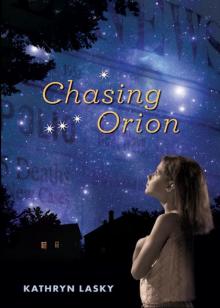 Chasing Orion
Chasing Orion Star Rise
Star Rise The River of Wind
The River of Wind More Than Magic
More Than Magic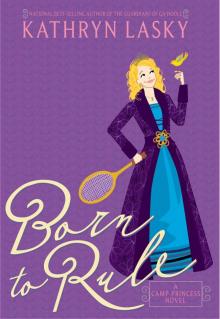 Born to Rule
Born to Rule The Hatchling
The Hatchling The Rescue
The Rescue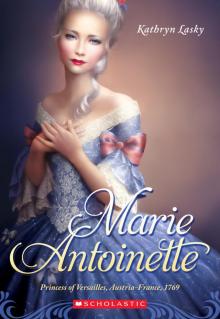 Marie Antoinette: Princess of Versailles, Austria - France, 1769
Marie Antoinette: Princess of Versailles, Austria - France, 1769 The War of the Ember
The War of the Ember Spiders on the Case
Spiders on the Case To Be a King
To Be a King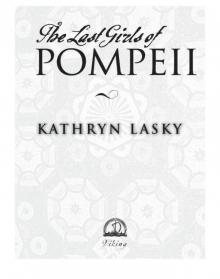 The Last Girls of Pompeii
The Last Girls of Pompeii The Outcast
The Outcast Exile
Exile Night Witches
Night Witches Spirit Wolf
Spirit Wolf The Quest of the Cubs
The Quest of the Cubs Frost Wolf
Frost Wolf The Keepers of the Keys
The Keepers of the Keys The Extra
The Extra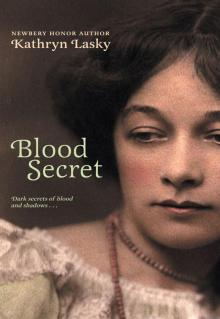 Blood Secret
Blood Secret Watch Wolf
Watch Wolf Blazing West, the Journal of Augustus Pelletier, the Lewis and Clark Expedition
Blazing West, the Journal of Augustus Pelletier, the Lewis and Clark Expedition The Capture
The Capture The Burning
The Burning The Journey
The Journey Unicorns? Get Real!
Unicorns? Get Real! The Escape
The Escape Star Wolf
Star Wolf Ashes
Ashes Wild Blood
Wild Blood Tangled in Time 2
Tangled in Time 2 The Siege
The Siege Hannah
Hannah Elizabeth
Elizabeth A Journey to the New World
A Journey to the New World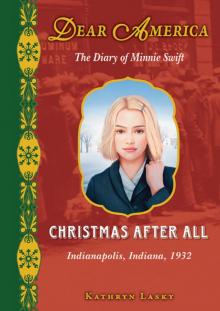 Christmas After All
Christmas After All Mary Queen of Scots
Mary Queen of Scots